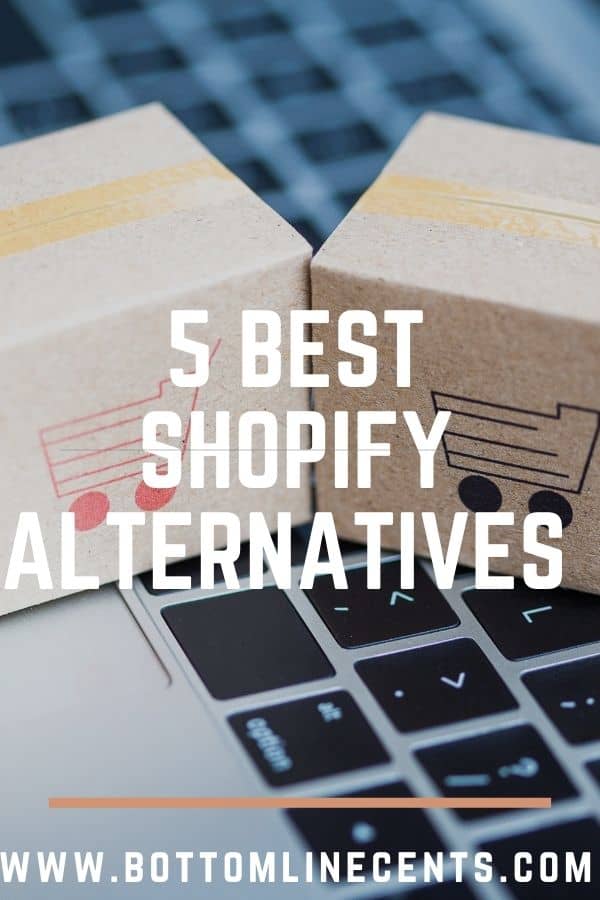Looking to start a dropshipping store but don't want to do it on Shopify? Today, we'll review the best shopify alternatives for dropshipping that you could try instead.
Shopify can often be a little bit costly when starting out, heck when I started my first few shopify stores I often ended up failing and wished I had some alternative before diving deep. It would have saved me thousands of dollars worth of trial and error, that could have been dedicated to an advertising budget.
So in this article we'll take a look at the best shopify alternatives that can lead to having a successful store without forking out thousands.
After that we'll cover some shopify alternative questions that a lot of you have. So let's dive right into it..

BigCommerce is The Best Shopify Alternative for Dropshipping
When you need a no drama, easy to use drag-and-drop store editor, then BigCommerce is the platform for you.
BigCommerce has been around for about 10 years now and they offer a simple yet intuitive user interface, somewhat similar to Shopify. The themes are elegant and stunning enough to make any store look really premium and professional.
They offer seven amazing themes, across many industries, and they’re ready to use right from the start.
It boasts in depth content-marketing features which allow you to promote just about anything on the net and its geared to increasing conversion rates.
A big bonus I love about this eCommerce software is that it has hundreds of built-in features, which is perfect for cutting costs on pesty apps that can cost a bit.
They offer tonnes of integration with social channels such as Pinterest and Facebook and it also means you can integrate your store to sell with Amazon and Ebay.
BigCommerce starts at about $29.95 a month to $249 per month, which can be steep. Their packages are based on revenue per year and if you exceed certain sales thresholds, expect to be bumped up.
Pros:
- Alright for Most Business Models
- Good Focus on SEO Performance
- Unlimited Number of Products
- Fantastic Theme Designs
- Wide Array of Features
- No Additional Transaction Fees (Can hurt your wallet)
- Multi-Channel Selling
- Decent Speed in Mobile Store
- Hosted
Cons:
- Very Expensive For High Revenue Stores
- Few Free Themes
- Inconsistent Speeds
- No One-Click Post Purchase Upsells
Woocommerce
Arrh! The birth of my eCommerce fruits started with WooCommerce. This platform is an open source extension to any WordPress website. What’s important is that its a free package that allows you to add a shopping cart to your website.
I find that scaling with Woocommerce can be difficult as it requires you to have impeccable server speeds, which can cost quite a bit. Why is having fast server speeds important?
Well, if someone was shopping on your site and they found it slow, unresponsive or just buggy they will probably loose trust. Besides that, Woocoomerce needs a bit of love and tweaking in order to build a great mobile friendly website.
The thing I love about WooCoomerce is that it provides premium add-ons for a one time payment, unlike Shopify’s monthly payment requirements.
Troubleshooting with WooCommerce is slightly tedious and if you run into a glitch with your website, you’ll be better off hiring a plugin developer to help you resolve it in good time.
With Shopify, you have the full support or technical customer representatives that can solve your problems ASAP.
Pros:
- No Additional Transaction Fees
- Free Plans Available E
- asy To Set Up And Use
- Seamless WordPress Integration
- Post Purchase/1-Click Upsells Available
Cons:
- No Hosting
- Requires Tech Skills
- Can Be Slow
- Blame Game With Theme Design/Hosting
Shopify Alternative - Volusion
The pricing model of Volusion is quite similiar to BigCommerce, as in they charge you based on your revenue. Volusion is another shopify alternatives that I prefer as it does not charge for additional transaction fees like Shopify.
What you get is an all in one-page checkout that has eBay integration available as well if you get a standalone premium addon.
There is a large library of templates that is available on all of its packages, which will suit plenty of industries. One thing you need to keep track of is your monthly allocation of bandwidth, which if exceeded can set you back at $7/GB.
The biggest downside of Volusion is that, it requires a bit of coding knowledge which can put a lot of non-tech folk off from using their software.
Pros:
- Easy-To-Use
- Unlimited Product Options
- No Additional Transaction Fees
- Free Quality Themes
- Good Mobile App
- Multiple Payment Processors
Cons:
- Behind Other Hosted Solutions In Features
- The Slowest of The Marketing Leading Solutions
- Monthly Bandwidth Limit
- Lack Of Integration With PLA’s and Pinterest
- Coding Skills Are Required
- Weak Product Search Function
Magento
Like WooCommerce, Magento offers an open-source system that is packed with amazing features. More importantly it’s free! Advance customization can be undertaken with the platform, which can really make for a unique looking store.
The downside is that you’ll need to know a bit of coding. For beginners, it’s a little bit of a step up from the plug-and-play solution offered by Shopify, so may be a little much if you’re just starting out.
Magento is highly flexible and the optimization that you’re given allows you to scale stores to the moon and back. The community version is free to download, but as mentioned you need to program your store by yourself.
The enterprise edition can set you back at least $15,000 or more a year.
Pros:
- No Monthly Service Charges
- Robust SEO Tools
- Inventory Management
- A Broad Selection Of Payment Gateway Options
- API For Web Services
- Thousands Of Extensions, Advanced Customization
- Responsive Designs
Cons:
- Requires Coding and IT Security Skills
- Requires Hosting
- Not For Novice Users
Wix
Last, but not least, we have Wix! I stumbled across wix a fews years ago, looking for alternatives to WordPress. Wix offers an amazing drag-and-drop editor which pretty much anyone can use.
Stores can look pretty clean and impressive with the store builder, and what’s best is the software automatically scales stores for mobile. Wix typical ecommerce pricing is below.
What’s interesting to know is that you have unlimited bandwith (like Shopify) and you’re not limited to pricey revenue model caps.
Pros:
- Drag-and-Drop Editor, Tons of Tutorials for Self-Learners
- Rich Features
- Unique Design, 100+ Templates
- Works With Many Payment Gateways
- Free Plans With Wix Branding
Cons:
- Traffic Limits
- Limited Apps vs Shopify
- SEO
Current Issues with Shopify!
I’m not saying Shopify is the be end and end all! I’m saying that there are other platforms out there that can work better for you.
I want to point out some of the issues that I’ve learnt from Shopify, and this comes from 3 years of use with the platform.
- Additional transaction fees – unless you choose to process payments directly through Shopify’s in-house service, be ready to pay up to 2 % for every transaction.
- Liquid – Shopify’s custom template markup language isn’t the most straightforward syntax out there.
- Advanced features – real-time shipping rates, the ability to accept gift cards are only available in the higher-tier plans. The platform locks many advanced features behind a paywall. So if you need extra functionality, your monthly bill may get bloated out of proportion.
- SEO tools – rigid URL structures and a WordPress plugin that uses iFrames doesn’t quite translate into the best possible ranking performance, especially limiting large sites, where Information Architecture is essential. And you can’t customize your checkout page.
Without blabbing to much, lets get straight into this...
Conclusion
So those are my best Shopify Alternatives for dropshipping that I recommend. You may have another platform that you prefer and that is perfectly fine.
I have listed the aforementioned because I personally have been involved with using them or have come across them during my eCommerce ventures. Please share your thoughts in the comment box if you have a preferred alternative.
I would like to know what you have to say and will definitely consider adding it to the list once I’ve had a play around with it.


